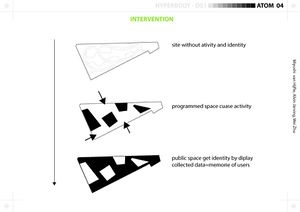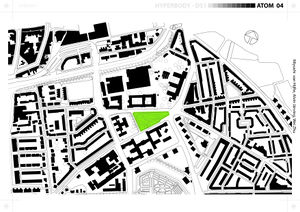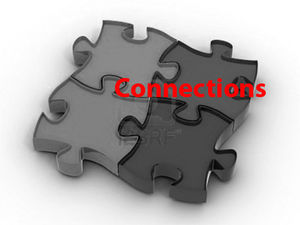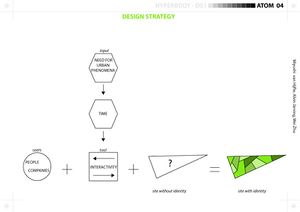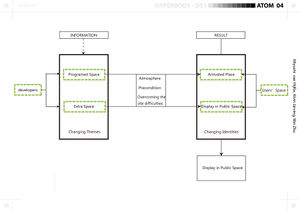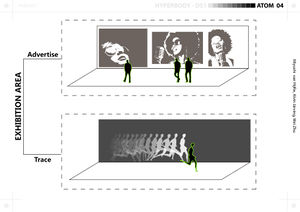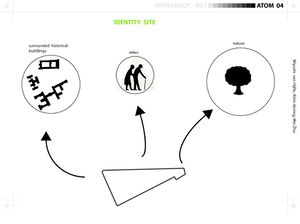atom04:'''PHASE 1'''
Contents |
PHASE 1 - DESIGN BRIEF
CONTEXT
Site
Site is located between the TU Delft Campus and the Old Town. see photos, maps, neighbours
We analized zoningplans from the municipality of Delft. We analized the site in variours scales see more
MISSING DIAGRAM: THE CAMPUS SCALE SITUATION BEING NOT ON THE TRAFFIC ARTERY
CONCLUSION
The zoning plan describes the need for the site to become the link between the city and the campus. To achieve that there is a need for the site to become more than its location per se promises. The link between the city and campus has to have a wider public meaning, the site has to start interrupting the local traffic flows to achieve needed critical mass. The lacking of clear character must be replaced with strong evolving identity that is not counting on program that might change rapidly. To clear the problems of invisibility the site needs to become closely tied to it neighbours. To attract the functions that will improve the site's relevance in the scale of Delft, the site needs to be contitioned for spatial affordance.
Actors
DIAGRAM MISSING THE RELATION BETWEEN DIFFERENT CLIENTS similR to that one:
USERS
mainly students ARCHIVE of interviews
CLIENTS
Delft Science Center, TU Delft, Food Gaterer, Bars, Clubs ARCHIVE of interviews
EXPERTS
validators of our design ARCHIVE of interviews
CONCLUSION
The users (mostly students) are consuming the public space character. Through that they are becoming the customers for the clients, the users can be seen as the amplifiers of the programme. The second group are the clients (TU Delft, Science centre, Food caterer) of the programmed space (commercial functions, exhibition, showroom,...)
OLD VERSION OF CLIENTS:
CONCEPT
Challenge
Our design challenge is to create a site with evolving identity which serves the spatial affordance of certain activities in dynamically changing programmatic context.
MISSING DIAGRAM updated design strategy... an update of the existing
Specialization
Site conditioning for identity. The site has to be conditioned to have a set of qualities that allow fixed character through desired activities. We are achieving these qualities through representational and spatial means. Our challenge is to manipulate the with the memory of the users to amplify activities.
the diagramm about the interface / miyushi
Project
Our Project is about the gradience between the private and public. The design effort lies in the transition space between the streetscape and the buildings. This concept creates the contrast between flexible buildings and the identity holding interface landscape.
DIAGRAM NEEDS TO BE IMPROVED BASED ON THAT GUY:
References / Definitions
ARCHIVE of references and definitions
OLD precondition STUFF
atom04:'''precondition tools'''
We are making the desired program possible through making preconditions to them. The precondition is a mixture of spatial and representational means. The spatial rules will be give characteristic of the theme, the representational rules will be amplify the situation. For this site we are creating solutions for the interfaces for commercial, non-govermental and preservation themes see more
OLD MANIFESTO:
We are dealing with extremely changeable program. We can create the constant indentity even when the program cannot be relied on. It makes the possibilities of development extremely flexible. The is our cure for the changing and unstable. We are providing tools for giving character to public space. We are making preconditions to specific programmes. These tools will overcome the difficulties of the site.
INTERVENTION
Process strategy
Memory Machine
The memory machine is a tactical tool to improve the local identity. This simple device can replay spatial situations to create the needed mood(abstract repetition) or to establish an interactive relationship with the users (personal repetition). The machine has recording and replaying devices (sound, visuals) to point out the virtual representation of wanted situation. The images can be also processed with certain filters to improve the identity of the client. The pictures can be repainted according to specific mood of event or missing mood of the moment. The filters are dealing with the colouring, contrasting, shuffling, sharpening, blurring and proportioning the reality towards emotion. The machine is collecting, processing and displaying data.
Public-private interface
The Border between the private and the public gives us a clear research theme on existing typologies. The parametrical model will have to deal with the complexity of the transition spaces, through levels that are describing the becoming from private to public. The generalization of those rules allow us to dive in the problem according to the level of the flexibility constraints. Those rules will give us several possibilities as an end result. According to the level of the programmatic instability it can be seen as total flexibility, a functional theme, a typology or even a specific function.
OLD STUFF:
Create accessible urban public space
We want to create an interactive space With an identity created by the memories of the users
